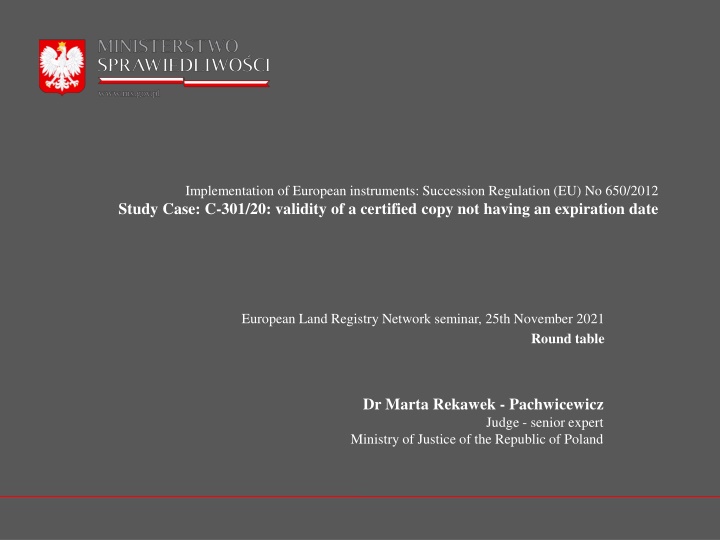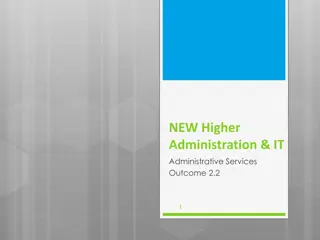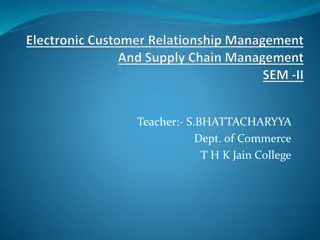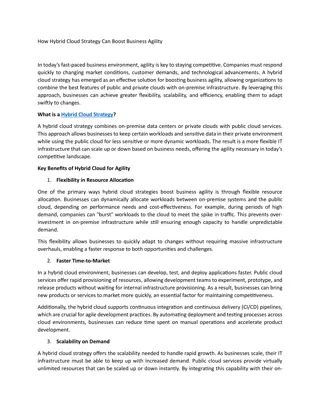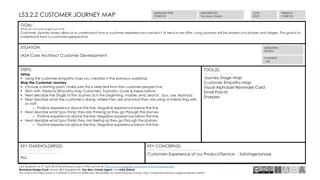Enhancing Customer Experience Through Operational Agility
Office of Field Operations at Small Business Administration showcased remarkable agility in adapting operations to a fully virtual model during the global pandemic, resulting in improved customer engagement and responsiveness. The office implemented various strategies and technologies to ensure seamless delivery of programs and services, setting a new standard for customer experience. Moving forward, there are identified areas for further enhancement to continuously improve CX efforts and better understand customer needs.
Download Presentation

Please find below an Image/Link to download the presentation.
The content on the website is provided AS IS for your information and personal use only. It may not be sold, licensed, or shared on other websites without obtaining consent from the author.If you encounter any issues during the download, it is possible that the publisher has removed the file from their server.
You are allowed to download the files provided on this website for personal or commercial use, subject to the condition that they are used lawfully. All files are the property of their respective owners.
The content on the website is provided AS IS for your information and personal use only. It may not be sold, licensed, or shared on other websites without obtaining consent from the author.
E N D
Presentation Transcript
Implementation of European instruments: Succession Regulation (EU) No 650/2012 Study Case: C-301/20: validity of a certified copy not having an expiration date European Land Registry Network seminar, 25th November 2021 Round table Dr Marta Rekawek - Pachwicewicz Judge - senior expert Ministry of Justice of the Republic of Poland
JUDGMENT OF THE COURT (Sixth Chamber) 1 July 2021 in Case C 301/20 Judgement 1.Article 70(3) of Regulation (EU) No 650/2012 of the European Parliament and of the Council of 4 July 2012 on jurisdiction, applicable law, recognition and enforcement of decisions and acceptance and enforcement of authentic instruments in matters of succession and on the creation of a European Certificate of Succession must be interpreted as meaning that a certified copy of the European Certificate of Succession, bearing the words unlimited duration , is valid for a period of six months from the date of issue and produces its effects, within the meaning of Article 69 of that regulation, if it was valid when it was presented to the competent authority. 2. Article 65(1) of Regulation No 650/2012, read in conjunction with Article 69(3) of that regulation, must be interpreted as meaning that the effects of the European Certificate of Succession are produced with respect to all persons who are named therein, even if they have not themselves requested that it be issued.
JUDGMENT OF THE COURT (Sixth Chamber) 1 July 2021 in Case C 301/20 The procedure for handling the case and the parties to the proceedings: request for a preliminary ruling under Article 267 TFEU from the Oberster Gerichtshof (Supreme Court, Austria), made by decision of 27 May 2020, received at the Court on 7 July 2020 parties: UE and HC (heirs) as plaintiffs, and Vorarlberger Landes- und Hypothekenbank AG as defendant, and Estate of VJ (heir) as intervening party the observations were submitted by: Austria, German, Spanish, Hungarian, European Commission the hearing the Opinion of the Advocate General at the sitting on 29 April 2021
JUDGMENT OF THE COURT (Sixth Chamber) 1 July 2021 in Case C 301/20 Facts: Vorarlberger Landes- und Hypothekenbank placed a sum of money and securities under judicial receivership, after HC and UE and their father, VJ, applied for the return of those assets, relying on the existence of competing rights, the merits of which were disputed. VJ, habitual resident of Spain, died on 5 May 2017, so the succession procedure was followed before a Spanish notary, in accordance with Spanish law. HC and UE submitted to the Bezirksgericht Bregenz (District Court, Bregenz, Austria) a certified copy of a European Certificate of Succession, issued by that Spanish notary at HC s request, in order to prove their status as VJ s heirs, in accordance with Article 62 et seq. of Regulation No 650/2012. The copy - a Form V - contains the entry unlimited in the section valid until . UE is mentioned on that certificate, alongside the name of his sister, as being the beneficiary of half of the inheritance concerned.
JUDGMENT OF THE COURT (Sixth Chamber) 1 July 2021 in Case C 301/20 District Court, Bregenz, Austria dismissed it and the Landesgericht Feldkirch (Regional Court, Feldkirch, Austria) dismissed the appeal. Regional Court said, that: only the person who applied for the issue of the ECS is in a position to establish his/her rights by submitting that certificate a copy of such a certificate without a limit of validity is contrary to the requirement to provide for a period of validity limited to six months certificate must be valid on the date on which the court of first instance delivered its decision. An appeal was brought before the Oberster Gerichtshof (Supreme Court, Austria) who said that: under Austrian law, the release of assets under sequestration requires a written request from all the parties as a final judgment has not been delivered
JUDGMENT OF THE COURT (Sixth Chamber) 1 July 2021 in Case C 301/20 as to the validity of a certified copy which does not contain an expiry date the Court observes that that situation is not provided for by Regulation No 650/2012 and that there is no case-law of the Court in that regard the Court asked whether, given that Regulation No 650/2012 does not provide for a situation where only one of the heirs applies for the issue of the ECS, the effect of that certificate concerns solely the applicant or also all mentioned persons the Court asked of the possible consequences of the expiry of the period of validity of a copy of the ECS (differences between the various academic positions and between the case-law of the Austrian courts and that of the German courts) Is it sufficient for that copy to be valid on the date on which the application is lodged or whether that copy must still be valid at the time when the decision is given
JUDGMENT OF THE COURT (Sixth Chamber) 1 July 2021 in Case C 301/20 Questions to the Court of Justice for a preliminary ruling: 1) Is Article 70(3) of Regulation No 650/2012 to be interpreted as meaning that a copy of the certificate issued, in disregard of that provision, without indicating an expiry date, for an unlimited period, is valid and effective indefinitely, or is valid only for a period of six months from the date of issue of the certified copy, or is valid only for a period of six months from another date, or is invalid and unsuitable for use within the meaning of Article 63 of Regulation No 650/2012? (2) Is Article 65(1) read in conjunction with Article 69(3) of that regulation to be interpreted as meaning that the certificate produces effects in favour of all persons who are mentioned on the certificate by name as heirs, legatees, executors of wills or administrators of the estate, with the result that even those who have not applied for the issue of the certificate themselves can use that certificate pursuant to Article 63 of regulation No 650/2012? (3) Must Article 69 read in conjunction with Article 70(3) of that regulation be interpreted as meaning that the legitimising effect of the certified copy of a certificate of succession must be recognised if it was still valid when it was first submitted but expired before the requested decision of the authority, or does that provision not preclude national law if the latter requires the certificate to be valid even at the time of the decision? Questions 1 & 3 are examined together.
JUDGMENT OF THE COURT (Sixth Chamber) 1 July 2021 in Case C 301/20 Question 1&3. Legal framework Article 69 Effects of the Certificate : 1. The Certificate shall produce its effects in all Member States, without any special procedure being required. 2. The Certificate shall be presumed to accurately demonstrate elements which have been established under the law applicable to the succession or under any other law applicable to specific elements. The person mentioned in the Certificate as the heir, legatee, executor of the will or administrator of the estate shall be presumed to have the status mentioned in the Certificate and/or to hold the rights or the powers stated in the Certificate, with no conditions and/or restrictions being attached to those rights or powers other than those stated in the Certificate. 3. Any person who, acting on the basis of the information certified in a Certificate, makes payments or passes on property to a person mentioned in the Certificate as authorised to accept payment or property shall be considered to have transacted with a person with authority to accept payment or property, unless he knows that the contents of the Certificate are not accurate or is unaware of such inaccuracy due to gross negligence. 4. ( ) 5. the Certificate shall constitute a valid document for the recording of succession property in the relevant register of a Member State, without prejudice to points (k) and (l) of Article 1(2).
JUDGMENT OF THE COURT (Sixth Chamber) 1 July 2021 in Case C 301/20 Question 1&3. Legal framework Article 70 Certified copies of the Certificate : 1. The issuing authority shall keep the original of the Certificate and shall issue one or more certified copies to the applicant and to any person demonstrating a legitimate interest. 2. The issuing authority shall, for the purposes of Articles 71(3) and 73(2), keep a list of persons to whom certified copies have been issued pursuant to paragraph 1. 3. The certified copies issued shall be valid for a limited period of six months, to be indicated in the certified copy by way of an expiry date. In exceptional, duly justified cases, the issuing authority may, by way of derogation, decide that the period of validity is to be longer. Once this period has elapsed, any person in possession of a certified copy must, in order to be able to use the Certificate for the purposes indicated in Article 63, apply for an extension of the period of validity of the certified copy or request a new certified copy from the issuing authority.
JUDGMENT OF THE COURT (Sixth Chamber) 1 July 2021 in Case C 301/20 Question 1&3. Legal framework Article 63 Purpose of the Certificate : 1. The Certificate is for use by heirs, legatees having direct rights in the succession and executors of wills or administrators of the estate who, in another Member State, need to invoke their status or to exercise respectively their rights as heirs or legatees and/or their powers as executors of wills or administrators of the estate. 2. The Certificate may be used, in particular, to demonstrate one or more of the following: (a) the status and/or the rights of each heir or, as the case may be, each legatee mentioned in the Certificate and their respective shares of the estate;
JUDGMENT OF THE COURT (Sixth Chamber) 1 July 2021 in Case C 301/20 Question 1&3. Legal framework Article 65 Application for a Certificate : 1. The Certificate shall be issued upon application by any person referred to in Article 63(1) (hereinafter referred to as the applicant ). 3. The application shall contain the information listed below, to the extent that such information is within the applicant s knowledge and is necessary in order to enable the issuing authority to certify the elements which the applicant wants certified, and shall be accompanied by all relevant documents either in the original or by way of copies which satisfy the conditions necessary to establish their authenticity, without prejudice to Article 66(2): (e) details of other possible beneficiaries under a disposition of property upon death and/or by operation of law: surname and given name(s) or organisation name, identification number (if applicable) and address; Three key elements: subject, identification, address.
JUDGMENT OF THE COURT (Sixth Chamber) 1 July 2021 in Case C 301/20 Question 1&3 were examine together, main arguments: the period laid down in Article 70(3) does not affect the period of validity of the European Certificate of Succession, but only that of the certified copies the ECS must be retained by the issuing authority, which issues copies the limitation of the period of validity of the copies was provided for by reason of the fact that the European Certificate of Succession produces its effects in all the Member States and is presumed to accurately demonstrate the existence of elements the validity of such a certified copy is limited, save in exceptional cases, to six months where a certified copy of the European Certificate of Succession is marked unlimited , that copy must be regarded as valid for a period of six months, because it comes from recital 7, which is to facilitate the proper functioning of the internal market by removing the obstacles to the free movement of persons this question arises, where the issuing authority has expressly stated, on Form V, that that copy does not have an expiry date
JUDGMENT OF THE COURT (Sixth Chamber) 1 July 2021 in Case C 301/20 Question 1&3 were examine together, main arguments: regarding the start date of the period of validity of that copy, the issuing authority must indicate, on Form V, after the date of validity of the certified copy, the date of its issue. The period of validity must be calculated from that date, which ensures the predictability and legal certainty required as regards the use of that copy none of the provisions of Regulation No 650/2012 directly answers that question the effects of that copy must be the same in all the Member States, so that its validity must be governed by Regulation No 650/2012 persons relying on the accuracy of the information certified in the certificate should be ensured protection where certified copies are presented while making payments or pass on succession property etc. Risk: if the validity of a certified copy of the ECS was required on the date of adoption, by the authority before which that copy is produced and not on the date on which the application was presented it would risk affecting the rights of the heirs and others entitled who, since they have no influence on the length of the proceedings leading to that decision, would have to request and present such a copy several times. contrary interpretation would result in additional delays, formalities and efforts, for both the persons concerned in the succession and for the authorities dealing with it
JUDGMENT OF THE COURT (Sixth Chamber) 1 July 2021 in Case C 301/20 Question 1&3 were examine together, conclusions: Therefore, the answer to the first and third questions is that Article 70(3) of Regulation No 650/2012 must be interpreted as meaning that a certified copy of the European Certificate of Succession, bearing the words unlimited duration , is valid for a period of six months from the date of issue and produces its effects, within the meaning of Article 69 of that regulation, if it was valid when it was presented to the competent authority.
JUDGMENT OF THE COURT (Sixth Chamber) 1 July 2021 in Case C 301/20 Question 2 was examine separately, main arguments: the effects of the ECS are produced with respect to all persons who are named as heirs, legatees, executors of wills or administrators of the estate, even if they have not themselves requested that it be issued Article 63(1) and (2)(a) lists the persons who may use it, as above, to prove, in another Member State, in particular their status and/or succession rights Question 1 of Round Table: Please, describe shortly the legal status of the heir, legatee, executor or administrator of the estate under national law (art. 63 Regulation 650/2012). What kind of succession rights and on what terms can they have? What legal act regulates these issues? so, article 63 details of possible beneficiaries under a disposition of property upon death and/or by operation of law, other than the applicant and that information must, pursuant to Article 68(g) of the regulation, be reproduced in that certificate. the effects of the ECS may be understood with regard to the persons as heirs, legatees, executors of wills or administrators of the estate, without the provision specifying whether that person must have the status of an applicant
JUDGMENT OF THE COURT (Sixth Chamber) 1 July 2021 in Case C 301/20 Question 2 was examine separately, main arguments: None of the provisions requires the person using a certified copy of the ECS to benefit from the effects of that certificate to have the status of an applicant for that certificate if any interested party were obliged to request a ECS and its certified copy, even though certificates and copies have already been issued for the latter, unnecessary costs would thereby arise - written observations of the European Commission
JUDGMENT OF THE COURT (Sixth Chamber) 1 July 2021 in Case C 301/20 Question 2 was examine separately, conclusions: The answer to the second question is that Article 65(1) of Regulation No 650/2012, read in conjunction with Article 69(3) thereof, must be interpreted as meaning that the effects of the European Certificate of Succession are produced with respect to all persons who are named, even if they have not themselves requested that it be issued.
JUDGMENT OF THE COURT (Sixth Chamber) 1 July 2021 in Case C 301/20 Practical problems with using the ESC in EU countries and methods of solving them: Question 2 of Round table: Please, describe shortly whether in the practice of your country there were problems with the use of the European Succession Acts in the land registry ? Is it a common situation? If yes, how do you solve problems? Other advanced and useful information e.g. Recommendations on Electronic Will Registration and Data Exchange + e-Justice Expert Group Interconnection of Registers of Wills Final Report Country by country information: https://e-justice.europa.eu/166/EN/succession Webpage bookmark: Find information per region Let s take Estonia: https://e-justice.europa.eu/166/EN/succession?ESTONIA&member=1
JUDGMENT OF THE COURT (Sixth Chamber) 1 July 2021 in Case C 301/20 Practical problems with using the ESC in EU countries and methods of solving them: Ten-questions method: 1. How is the disposition of property upon death (will, joint will, agreement on succession) drawn up? 2. Should the disposition be registered and if yes, how? 3. Are there restrictions on the freedom to dispose of property upon death (e.g. reserved share)? 4. In the absence of a disposition of property upon death, who inherits and how much? 5. What type of authority is competent: 6. Short description of the procedure to settle a succession under national law, including the winding-up of the estate and sharing out of the assets (this includes information whether the succession procedure is initiated by a court or other competent authority on its own motion) 7. How and when does one become an heir or legatee? 8. Are the heirs liable for the deceased's debts and, if yes, under which conditions? 9 .What are the documents and/or information usually required for the purposes of registration of immovable property? 10. Which documents are typically issued under national law in the course of or at the end of succession proceedings proving the status and rights of the beneficiaries? Do they have specific evidentiary effects?
Overall summary The current environment of the judgment Increasing numer of marriages between nationals of the EU Member States (appr. 450,000 cross-border succession cases in the EU every year) Introduced as a new EU law legal instrument ECS as sui generis Different sort of rules: substantive, procedural, conflic solution - applicable in all MSs Flexible system (twin-track solution) High cost, high value system Digitisation as useful process: Electronic Will Registration and Data Exchange e.g. the platform of the European Network of Registers of Wills Association (ENRWA) which interconnects http://www.arert.eu/?lang=en example od Polsih FS 20 national registers
Overall summary The current environment of the judgment IC RW Expert Group Recommendations on Electronic Will Registration and Data Exchange 2015 (Estonia as supporting institution) Recommendations in legal aspects The European Network of Registers of Wills Association (ENRWA) Member States are invited to analyse the legal possibilities for: a) forwarding information on the existence of wills by using electronic means; b) forwarding a certified digitised copy of the will by using electronic means; c) forwarding a copy of the succession certificate by using electronic means.
Thank you very much for your attention Mail: Marta.Rekawek-Pachwicewicz@ms.gov.pl
